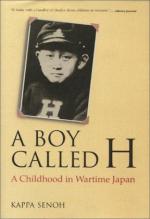|
This section contains 857 words (approx. 3 pages at 400 words per page) |

|
Militarism
Lurking behind the day-to-day experiences of the growing boy is the specter of the imperialism and militarism that characterized Japanese society in the 1930s and continued until the Japanese defeat in 1945. Imperialism and militarism are apparent almost from the beginning, in the passing reference to the neighborhood celebrations that followed the fall of Nanking, China, to invading Japanese forces in 1937. H is affected by the war when he is only seven years old, when two of his friends are called up to the army. One of them commits suicide rather than enlist.
In the schools, boys are indoctrinated with the belief that their highest duty is to sacrifice themselves for the emperor, to die for the nation. No one except H seems to question this view, and as the years go by, militarization gets more pronounced. When H is about nine, the boys have a swimming class and...
|
This section contains 857 words (approx. 3 pages at 400 words per page) |

|




